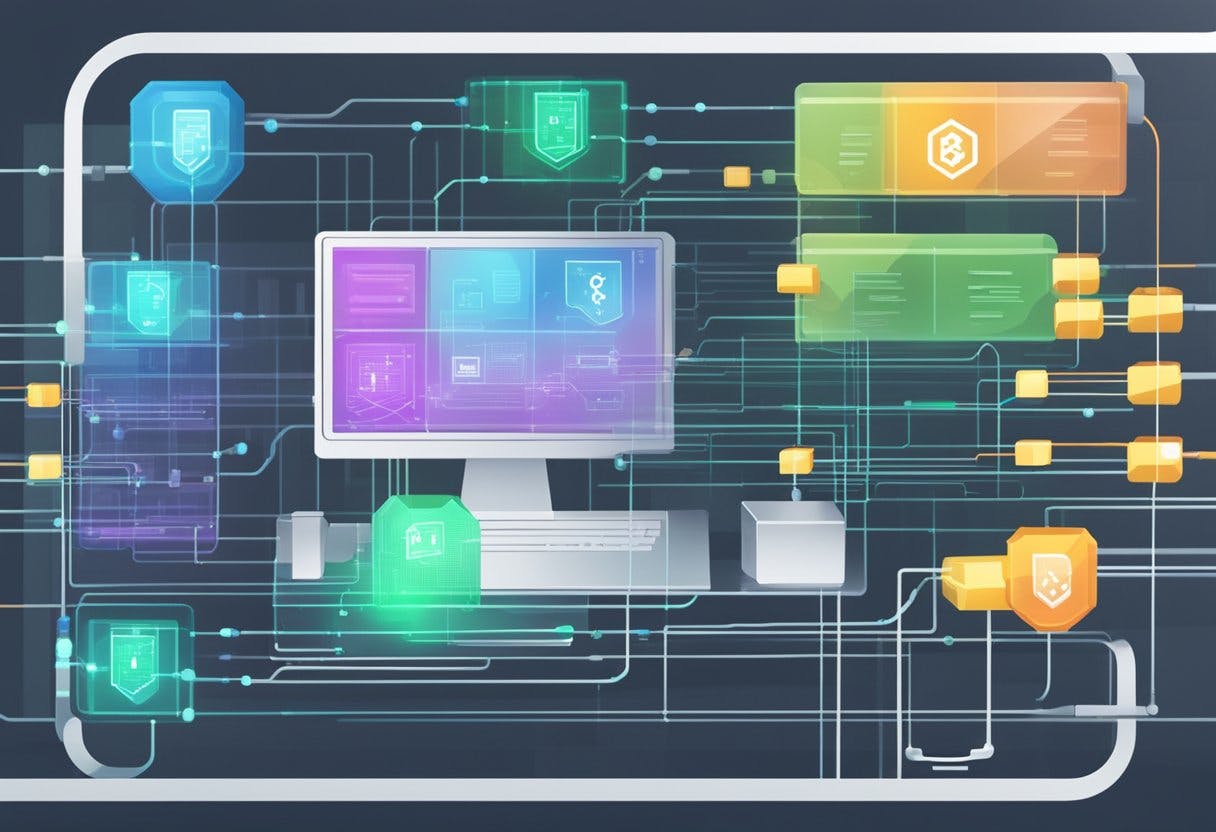Blockchain technology is rapidly gaining popularity in the healthcare industry due to its potential to enhance security and transparency in medical data management. With the increasing amount of sensitive data being generated and shared within the healthcare sector, there is a growing need for secure and transparent solutions to protect patient data and ensure its accuracy. Blockchain technology has emerged as a promising solution to address these challenges.

Blockchain technology is a distributed ledger system that allows for secure and transparent data sharing without the need for intermediaries. This technology has the potential to revolutionize the healthcare sector by providing a secure and transparent platform for medical data management. By leveraging blockchain technology, healthcare providers can ensure the integrity and confidentiality of patient data, while also enabling patients to have greater control over their health data.
In this article, we will explore the fundamentals of blockchain technology in healthcare, its implementation in medical data management, and its applications and use cases in the healthcare sector. We will also discuss the challenges and limitations of blockchain in healthcare and the future of this technology in the healthcare sector.
Key Takeaways
- Blockchain technology has the potential to enhance security and transparency in medical data management.
- Blockchain implementation in healthcare can ensure the integrity and confidentiality of patient data while enabling patients to have greater control over their health data.
- Despite its potential benefits, blockchain technology in healthcare still faces challenges and limitations that need to be addressed to fully realize its potential.
Blockchain Fundamentals in Healthcare

Understanding Blockchain Technology
Blockchain technology is a distributed ledger system that enables secure and transparent transactions without the need for a central authority. It is a decentralized system that allows multiple parties to share a common database, known as a blockchain, that is updated in real-time. Each block in the blockchain contains a unique hash that links it to the previous block, creating a chain that cannot be altered.
The Role of Decentralization
Decentralization is a key feature of blockchain technology that makes it ideal for healthcare systems. By removing the need for a central authority, blockchain technology allows for greater transparency, accountability, and security. Decentralization also allows for greater collaboration and coordination between different healthcare providers, patients, and other stakeholders.
Enhancing Data Security with Blockchain
Data security is a critical concern in healthcare systems. Blockchain technology provides a secure and immutable ledger that can be used to store and share sensitive healthcare data. Each block in the blockchain is cryptographically linked to the previous block, making it virtually impossible to alter or tamper with the data. This provides a high level of security and ensures that patient data is protected from unauthorized access or manipulation.
In addition, blockchain technology uses a consensus mechanism to validate transactions and ensure that all parties agree on the state of the ledger. This consensus mechanism ensures that the data stored on the blockchain is accurate, reliable, and trustworthy.
Overall, blockchain technology has the potential to revolutionize the healthcare industry by enhancing security, transparency, and collaboration. By leveraging the power of blockchain technology, healthcare providers can improve the quality of care, reduce costs, and provide better patient outcomes.
Blockchain Implementation in Medical Data Management

Blockchain technology has the potential to revolutionize the healthcare industry by enhancing security and transparency in medical data management. In this section, we will explore how blockchain implementation can address the challenges faced by traditional medical data management systems.
Medical Records and EHRs
Electronic Health Records (EHRs) are an essential component of modern healthcare systems. They contain patients’ medical histories, diagnoses, treatments, and other critical information. However, the traditional EHR systems have several limitations, such as data fragmentation, interoperability issues, and security concerns.
Blockchain-based EHR systems can address these limitations by providing a secure and decentralized platform for storing and sharing medical records. Medical data stored on the blockchain is immutable, transparent, and tamper-proof, ensuring data integrity and authenticity. Additionally, blockchain-based EHR systems can improve data interoperability, enabling seamless data sharing between healthcare providers.
Consent and Access Control
Consent and access control are critical components of medical data management. Patients have the right to control their medical data and determine who can access it. However, traditional medical data management systems often fail to ensure patient privacy and data security.
Blockchain-based consent and access control mechanisms can address these issues by providing patients with complete control over their medical data. Patients can grant or revoke access to their medical records using smart contracts, ensuring that their data is only accessible to authorized parties.
Interoperability and Data Sharing
Interoperability and data sharing are crucial for providing high-quality healthcare services. However, traditional medical data management systems often face interoperability issues, making it challenging to share data between healthcare providers.
Blockchain-based medical data management systems can address these interoperability issues by providing a secure and decentralized platform for data sharing. Medical data stored on the blockchain can be accessed by authorized parties, enabling seamless data sharing between healthcare providers.
In conclusion, blockchain implementation can enhance security and transparency in medical data management by addressing the limitations of traditional medical data management systems. Blockchain-based EHR systems can ensure data integrity and interoperability, while consent and access control mechanisms can provide patients with complete control over their medical data. Additionally, blockchain-based medical data management systems can enable seamless data sharing between healthcare providers, improving the quality of healthcare services.
Blockchain Applications and Use Cases in Healthcare

Blockchain technology has the potential to revolutionize the healthcare industry by enhancing security and transparency. The following subsections highlight some of the most promising use cases of blockchain technology in healthcare.
Supply Chain Management
The drug supply chain is a complex system that involves multiple stakeholders, including manufacturers, distributors, and pharmacies. Blockchain can provide a secure and transparent way to track drugs from the manufacturer to the patient, ensuring that drugs are not counterfeit or expired. This can help to reduce the risk of drug-related harm and improve patient safety.
Insurance and Billing
Blockchain can also be used to improve the efficiency and transparency of insurance and billing processes. Smart contracts on the blockchain can potentially help to settle health insurance claims and manage payment in real-time, making the process more efficient and transparent for payers, providers, and patients.
Clinical Trials and Research
Blockchain can also be used to enhance the transparency and integrity of clinical trials and research. Blockchain can help to ensure that data is secure, tamper-proof, and accessible to all stakeholders. This can help to improve the accuracy and reliability of research findings, ultimately leading to better patient outcomes.
In conclusion, blockchain technology has the potential to transform the healthcare industry by enhancing security and transparency. By leveraging blockchain technology, healthcare applications can streamline processes, reduce costs, and improve patient outcomes.
Challenges and Limitations of Blockchain in Healthcare
While blockchain technology has the potential to revolutionize healthcare by enhancing security and transparency, there are several challenges and limitations that must be addressed before widespread adoption can occur.
Scalability and Performance Issues
One of the main challenges facing blockchain in healthcare is scalability and performance. Blockchain technology is known for its slow transaction processing speed, which can lead to delays in healthcare data sharing and processing. This is particularly problematic in the healthcare industry, where timely access to patient data can be critical. Additionally, as the size of the blockchain grows, it becomes increasingly difficult to maintain and manage, which can further slow down performance.
Regulatory and Compliance Hurdles
Another significant challenge facing blockchain in healthcare is regulatory and compliance hurdles. The healthcare industry is heavily regulated, and any new technology or process must comply with strict regulations, such as HIPAA. Blockchain technology is still relatively new, and there is a lack of clarity around how it fits into existing regulations. As a result, healthcare organizations may be hesitant to adopt blockchain technology until there is more clarity around regulatory compliance.
Technical and Adoption Barriers
Finally, there are technical and adoption barriers that must be addressed before blockchain technology can be widely adopted in healthcare. One significant barrier is the lack of technical expertise and understanding of blockchain technology among healthcare professionals. Additionally, the cost of implementing blockchain technology can be prohibitive, particularly for smaller healthcare organizations. Finally, there is a lack of standardization around blockchain technology, which can make it difficult to integrate with existing healthcare systems.
In conclusion, while blockchain technology has the potential to enhance security and transparency in healthcare, there are several challenges and limitations that must be addressed before widespread adoption can occur. These challenges include scalability and performance issues, regulatory and compliance hurdles, and technical and adoption barriers.
The Future of Blockchain in the Healthcare Sector
Blockchain technology is a disruptive innovation that has the potential to revolutionize the healthcare sector. It is a decentralized and immutable digital ledger that allows secure and transparent storage and sharing of data between multiple parties. According to a Forbes article, the healthcare sector is expected to be one of the major beneficiaries of blockchain technology in the coming years.
One of the key benefits of blockchain technology is enhanced security and privacy. Blockchain provides a secure and tamper-proof platform for storing and sharing sensitive health information. The use of smart contracts can further enhance security by automating the execution of contracts based on predefined rules and conditions.
Another area where blockchain technology can bring significant benefits is data interoperability. The lack of interoperability between different healthcare systems and providers has been a major challenge in the healthcare sector. Blockchain technology can provide a common platform for sharing data between different healthcare providers, improving data interoperability and patient outcomes.
In addition to security and interoperability, blockchain technology can also facilitate innovation in the healthcare sector. The use of blockchain technology can enable the development of new applications and services that can improve patient care and outcomes. For example, blockchain technology can be used to develop decentralized clinical trials, enabling patients to participate in clinical trials from anywhere in the world.
Looking ahead, future research on the use of blockchain technology in the healthcare sector is needed to fully realize its potential. The integration of artificial intelligence, machine learning, and IoT technologies with blockchain can further enhance its capabilities and applications in the healthcare sector.
Frequently Asked Questions
What are the primary benefits of implementing blockchain in the healthcare sector?
Blockchain technology offers numerous benefits to the healthcare sector. The primary benefit is the ability to enhance security and transparency in healthcare systems. Blockchain can also improve the efficiency of healthcare services and reduce costs associated with data management. Additionally, blockchain can help to mitigate interoperability and data sharing challenges in the industry by creating an overarching mechanism to link disparate personal records and can stimulate data sharing by connecting owners and buyers directly.
How can blockchain technology enhance security in healthcare systems?
Blockchain technology can enhance security in healthcare systems by providing a decentralized, tamper-proof record of all transactions. The use of cryptographic algorithms ensures that data is secure and cannot be altered or deleted. Additionally, blockchain can enable secure sharing of sensitive medical information between healthcare providers and patients, while maintaining patient privacy and confidentiality.
What are the steps involved in integrating blockchain into existing healthcare infrastructure?
Integrating blockchain into existing healthcare infrastructure involves several steps. First, healthcare organizations need to identify the areas of their operations that could benefit from blockchain technology. Next, they need to evaluate the different blockchain solutions available and select the one that best meets their needs. Once a blockchain solution is selected, the organization needs to develop a plan for integrating the technology into their existing infrastructure. This may involve developing new software applications, training staff, and implementing new processes.
In what ways does blockchain improve transparency within healthcare services?
Blockchain technology can improve transparency within healthcare services by providing a tamper-proof record of all transactions. This can help to prevent fraud and ensure that all parties involved in a transaction have access to the same information. Additionally, blockchain can enable patients to have greater control over their medical records, allowing them to share their information with healthcare providers as they see fit.
How is blockchain technology being utilized in health insurance?
Blockchain technology is being utilized in health insurance to improve the efficiency and security of the claims process. By using blockchain, insurers can automate claims processing, reduce the risk of fraud, and improve the accuracy of claims data. Additionally, blockchain can enable insurers to provide more personalized coverage to their customers, based on their specific health needs and risk profiles.
Can you explain the impact of blockchain on the management and storage of medical records?
Blockchain technology can have a significant impact on the management and storage of medical records. By using blockchain, medical records can be stored in a secure, decentralized database that is accessible to authorized parties. This can help to prevent data breaches and ensure that patient information is secure. Additionally, blockchain can enable patients to have greater control over their medical records, allowing them to share their information with healthcare providers as they see fit. Overall, blockchain technology has the potential to revolutionize the way medical records are managed and stored, improving the efficiency and security of healthcare services.
Read More




